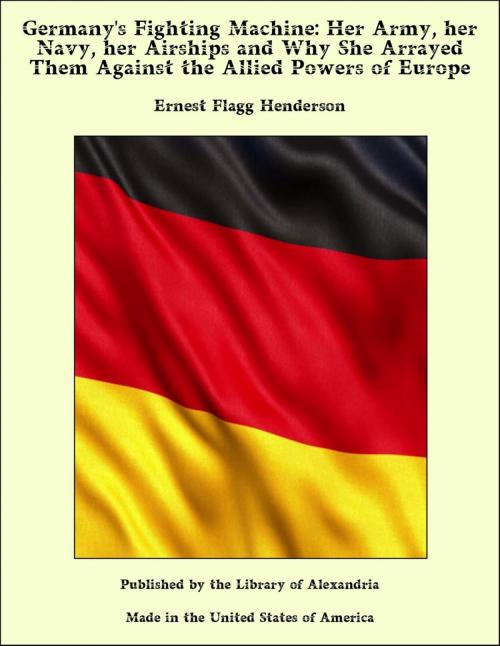Germany's Fighting Machine: Her Army, her Navy, her Airships and Why She Arrayed Them Against the Allied Powers of Europe
Nonfiction, Religion & Spirituality, New Age, History, Fiction & Literature| Author: | Ernest Flagg Henderson | ISBN: | 9781465616159 |
| Publisher: | Library of Alexandria | Publication: | March 8, 2015 |
| Imprint: | Language: | English |
| Author: | Ernest Flagg Henderson |
| ISBN: | 9781465616159 |
| Publisher: | Library of Alexandria |
| Publication: | March 8, 2015 |
| Imprint: | |
| Language: | English |
When a great and extraordinary event takes place it is easy, somewhere in the world, to point to omens and prophecies that have heralded it. But in the case of the present war we can see in the German newspapers how, from month to month of the present year, the struggle was felt to be more and more imminent and how Russia, the power that eventually precipitated the catastrophe, was felt to be the center of real danger. “In well-informed diplomatic circles,” writes the Magdeburger Zeitung in January, 1914, “the impression can not be concealed that in Russia at present there prevails a thoroughly hostile attitude to Germany and Austria-Hungary, and that the agitation in the czar’s realm is greater even than during the last Balkan crisis. … It looks as though Russia were preparing to make an extraordinarily great show of strength against a specific, not far distant date.” And the Deutsche Tageszeitung: “What is Russia’s purpose in building a mighty fleet of dreadnaughts for the Baltic? Surely not merely to coerce Sweden.” Again the Madgeburg paper: “The Russian government, which already owes French capitalists twelve billions, has received a new loan of two billions five hundred millions, of which five million are yearly to be issued in Paris. This whole gigantic sum is exclusively to be spent for building strategic railways along the German-Russian boundary. … France compelled Russia to do this. The French general staff thinks that Russia, because of her clumsiness in mobilizing, but especially for lack of tracks leading to the German frontier, will not be able, in a new war with Germany, to bring help to France in time. Russia has now fulfilled France’s wishes in this regard. Thus does the Franco-Russian alliance, which of late seemed to be falling into oblivion, celebrate its resurrection.” In February the Hallesche Zeitung writes: “To keep friendship with Russia is one of the chief aims of our foreign policy, but it is sometimes made very hard for us indeed. … They keep the peace because it is to the advantage of the czar’s empire to do so; but they are to be had for every combination directed against Germany.” And the Dresdener Nachrichten: “The Russian-German relations leave very much to be desired at the moment. The Russian government fails to show the least approachableness in foreign questions and Russian society and the press are in an extremely anti-German mood. Evidences of the same thing are to be seen in their attitude to Austria. … The Russian policy lets itself be taken more and more in tow by the French desires, and has nothing but polite speeches left for Germany.” The Weser Zeitung finds the explanation of the hostility in Germany’s efforts to help the Turks reorganize their army, and declares, “Here we have touched one of the weakest spots in Russia’s world-policy, her endeavor to get to the Mediterranean.” The Fränkische Kurier thinks that Russia intends to form a protectorate over the Balkan states as a military weapon against Austria and her allies: “The soul of this endeavor is the Russian diplomacy and the Servian minister-president, Pasitsch.” The Dresdener Anzeiger observes that the influence of the Pan-Slavist party over the Russian government is steadily growing and that the extraordinary activity in military matters ill suits the constant peace assurances: “The measures are pointed against Austria-Hungary.”
When a great and extraordinary event takes place it is easy, somewhere in the world, to point to omens and prophecies that have heralded it. But in the case of the present war we can see in the German newspapers how, from month to month of the present year, the struggle was felt to be more and more imminent and how Russia, the power that eventually precipitated the catastrophe, was felt to be the center of real danger. “In well-informed diplomatic circles,” writes the Magdeburger Zeitung in January, 1914, “the impression can not be concealed that in Russia at present there prevails a thoroughly hostile attitude to Germany and Austria-Hungary, and that the agitation in the czar’s realm is greater even than during the last Balkan crisis. … It looks as though Russia were preparing to make an extraordinarily great show of strength against a specific, not far distant date.” And the Deutsche Tageszeitung: “What is Russia’s purpose in building a mighty fleet of dreadnaughts for the Baltic? Surely not merely to coerce Sweden.” Again the Madgeburg paper: “The Russian government, which already owes French capitalists twelve billions, has received a new loan of two billions five hundred millions, of which five million are yearly to be issued in Paris. This whole gigantic sum is exclusively to be spent for building strategic railways along the German-Russian boundary. … France compelled Russia to do this. The French general staff thinks that Russia, because of her clumsiness in mobilizing, but especially for lack of tracks leading to the German frontier, will not be able, in a new war with Germany, to bring help to France in time. Russia has now fulfilled France’s wishes in this regard. Thus does the Franco-Russian alliance, which of late seemed to be falling into oblivion, celebrate its resurrection.” In February the Hallesche Zeitung writes: “To keep friendship with Russia is one of the chief aims of our foreign policy, but it is sometimes made very hard for us indeed. … They keep the peace because it is to the advantage of the czar’s empire to do so; but they are to be had for every combination directed against Germany.” And the Dresdener Nachrichten: “The Russian-German relations leave very much to be desired at the moment. The Russian government fails to show the least approachableness in foreign questions and Russian society and the press are in an extremely anti-German mood. Evidences of the same thing are to be seen in their attitude to Austria. … The Russian policy lets itself be taken more and more in tow by the French desires, and has nothing but polite speeches left for Germany.” The Weser Zeitung finds the explanation of the hostility in Germany’s efforts to help the Turks reorganize their army, and declares, “Here we have touched one of the weakest spots in Russia’s world-policy, her endeavor to get to the Mediterranean.” The Fränkische Kurier thinks that Russia intends to form a protectorate over the Balkan states as a military weapon against Austria and her allies: “The soul of this endeavor is the Russian diplomacy and the Servian minister-president, Pasitsch.” The Dresdener Anzeiger observes that the influence of the Pan-Slavist party over the Russian government is steadily growing and that the extraordinary activity in military matters ill suits the constant peace assurances: “The measures are pointed against Austria-Hungary.”















